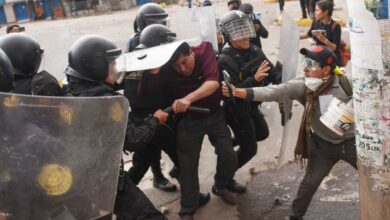Alexandria–At 2 AM on 3 December, 2009 Abdallah Abdel Aziz opened the door in response to a loud knock on the family’s front door. The six-year-old was completely unaware of the danger that was about to follow.
About a dozen members of the Muharram Bek, Alexandria police force entered the house demanding the whereabouts of Ibrahim, the 18-year-old son of Afaf and Mohamed Abdel Aziz, the owner of a small bakery. Upon being informed that he was not home, the officers decided to punish the family instead.
“The boy opened the door … and I heard them say ‘take her, take her’ and suddenly I could no longer see from the amount of beating,” Afaf said, "then they pushed me down the stairs.”
Afaf, 60, still suffers from a severe injury to her right leg from that day.
When Faten Abdel Aziz, 40, tried to interfere, an officer said “take her and kill her as well,” Faten recounted. For her father it was no different.
Late that night the police dragged the three of them down the street, locked them in security vehicles, and took them to the police station.
At the police station no one was interested in hearing their side of the story. An officer yelled at Afaf when she tried to explain what was happening, “shut up or I will squash you,” she recalled him saying.
When Afaf’s daughter was brought before another interrogating officer he threatened Afaf’s unmarried daughter Siham saying he would, “turn her into a woman,” she explained. Later on he told her to shut up or else he would fabricate drug charges against her and her family.
“It is the first time I learned that the public prosecutor can be influenced in this way, I had always thought that they are supposed to be an independent entity,” Faten Abdel Aziz reflected on the incident, “in our case I sensed that the prosecutor and the officers held one shared position.”
The police never came after Ibrahim again. His father, mother and two sisters were transferred to separate prisons on charges of resisting state authorities. The officers accused 70-year-old Mohamed Abdel Aziz of trying to light a bottle of natural gas in a collective family effort to prevent the authorities from arresting his son.
When the family finally appeared before a judge 35 days later, the court deemed them innocent and released them immediately.
The family believes only one interpretation of the course of events.
Prior to the late night police attack Ibrahim Abdel Aziz had been incarcerated without charge for a year allegedly due to job-related problems.
Ibrahim sells satellite TV subscriptions, and upon his release he learned that the two streets of his neighborhood that he used to administer had been given to his competitor. The youth was determined to take back his old territory and began cutting his old customers’ cables seeking a way to threaten his competitor.
“The police came with orders to arrest us. There is no explanation other than that they are in cohorts with Ibrahim’s competitor,” said Mohamed Abdel Aziz.
The family explained that satellite TV subscriptions earn the company about LE165,000 a month. They are certain that the police are being paid a share of this illegal operation, up to LE50,000 a month. Ibrahim interfered in their dirty business and thus had to be punished.
When they couldn’t locate Ibrahim the police punished his entire family instead. They wanted to send a message: No one disrupts the police’s interests, legal or illegal.
Unlike many others, the Abdel Aziz family chose to go public with the story.
“I thought we lived in a democratic country,” Faten said. “This only happens in the Dark Ages,” her father added.
“Of course I live in fear, if this is what they do to me when I haven’t done anything, then I have to be afraid,” said Mohamed Abdel Aziz. Though the father does not fully blame Ibrahim for the events, he said he never wanted to see his son again nor talk to him.
His wife Afaf is scared every time someone knocks on the door. “I don’t sleep well at night,” she said, “I keep reliving those days in prison.”
In March, the Federation Internationale des Droits de l’Homme (FIDH) and its Egyptian partner organizations held a press conference following the release of a report on torture in Egypt.
Aida Seif el-Dawla, program coordinator of the Nadim Center for Rehabilitation of Victims of Violence explained that judging from the patients visiting her center the Egyptian authorities’ use of torture “intensifies by the day,” with the aim of imposing their “hierarchy of power.”
Meanwhile Stéphanie David, the North Africa and Middle East desk director for FIDH explained that amendments made in 2007 provide a blanket for arrests, home searches and holding of suspects and have turned such legal breaches into a systemic occurrence. Rather than holding the Egyptian authorities accountable, Western governments are “patting it on the back,” the FIDH regional director said.
David explained that the Egyptian government prohibits legal procedures against torturers. If a case is raised, torturers are usually sent to the public prosecutor who usually does not prosecute state-sanctioned offenders.
At the press conference Aida Seif el-Dawla explained that the current Egyptian public’s largely passive response to torture could one day turn violent. “Police stations might be burned, police officers might be shot,” she said, adding that this could evolve as part of a “nationwide vendetta.”
Rights campaigners say what is clear in the Abdel Aziz family case is that the law is employed to legitimize police-sponsored criminality. Torture is used to instill fear in anyone who might consider interfering in what Stéphanie David of the FIDH terms a, “culture of exceptionality.”
“The TV dish sellers are the ones who said they would have us arrested. They wouldn’t have said that unless they were confident in the ‘rulers’ of the neighborhood,” Mohamed Abdel Aziz added.
Seif el-Dawla warned, “if they [the Egyptian authorities] do not want chaos and violence they better start holding people accountable … not only the ones carrying out torture with their own hands, but also those that give the orders.”




